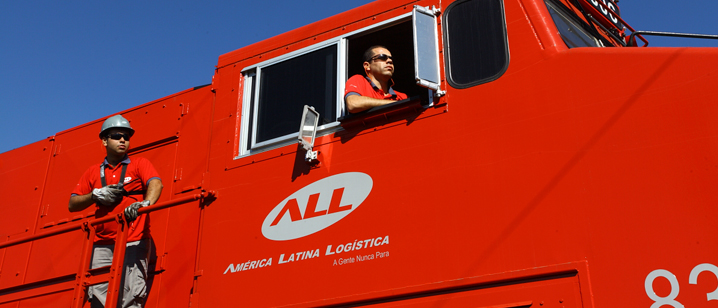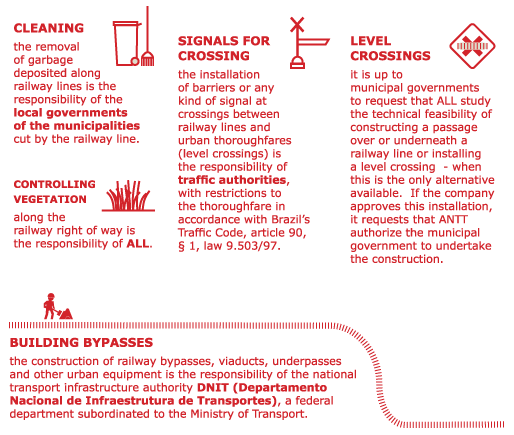Government bodies

Relationship
ALL maintains integral, transparent relations with the government, striving to fulfill its legal and contractual obligations.
Government relations are the responsibility of the company's Institutional Relations area, which manages all requests for information and demands for action. Requests are normally in writing, but whenever possible ALL seeks to manage these relations on a personal basis.
For this reason, in addition to its Institutional Relations structure in Curitiba, the company has representatives in Brasília (Distrito Federal), São Paulo (São Paulo) and Uruguaiana (Rio Grande do Sul). For ALL, investing in personal contact with the government bodies with which it interacts ensures greater transparency, effectiveness and agility in the processes related to each government organization.
The ANTT (Agência Nacional de Transportes Terrestres) is one of the main government agencies with which ALL relates. Responsible for rail transportation in the country, one of the organization's attributions is managing concession contracts and overseeing the fulfillment of rail service contract conditions.
Part of ANTT's responsibility is tracking ALL's fulfillment of safety and freight volume targets set forth in the concession contract. These indicators are tracked by the company, which reports them to the agency on a monthly basis (see the targets and results related to accidents in the tables in Operational safety).
Other significant public authorities for ALL are: the Ministry of Transport; the national transport infrastructure department DNIT (Departamento Nacional de Infraestrutura de Transportes); the environmental authority Ibama (Instituto Brasileiro do Meio Ambiente e dos Recursos Naturais Renováveis); the BNDES (Banco Nacional de Desenvolvimento Econômico e Social), the main public institution financing railway works in Brazil; the Public Prosecution department, Ministério Público; as well as local councils and governments of the municipalities in which the company operates.
Sector discussions
The most significant sector association for ALL is the national railway transportation body ANTF (Associação Nacional dos Transportadores Ferroviários). Although the company does not participate systematically in public policy discussions, it does take part in debates of interest to the industry both through the ANTF and on an independent basis. There were two main topics of interest in 2013: the Logistics Investment Plan (PIL) and the review of Tariffs for Public Cargo Transport Concessionaires.
The Logistics Investment Plan launched by the federal government in 2012 provides for the expansion of the Brazilian railway network, including the creation of new lines alongside existing concessions, as is the case of the Mairinque (São Paulo) to Porto Alegre (RS) route and rail access to the Port of Santos, both belonging to ALL concessions. The company is open to negotiation for the design of these routes in line with public interests, as long as the financial balance of its contracts is maintained. The tariff review was determined in ANTT resolutions in 2012, with an average reduction in tariff ceilings on the Southern, Paulista and Western networks of 15%, 29% and 47%, respectively, as well as a ceiling on tariffs for the Northern network. For ALL, the methodology used by ANTT in the process of reviewing tariff ceilings was specious and distorts the proposed ceilings, jeopardizing the financial-economic balance of its concession contracts.
The company also questions the way the review process was conducted, given that it is at odds with the terms of the concession contracts, which permit tariff reviews only in cases where these are justified. ALL obtained a court order enabling the company to continue to apply the old tariff ceilings.
ALL believes in the creation of a methodology to determine tariff ceilings that reflects the economic factors involved in railway operations fairly and benefits both concession holders and rail transport users. The company played an active role in the public consultation organized by ANTT in this process in an attempt to point out inconsistencies and suggest corrections.
Public finance
ALL's main source of financing works is the government foment bank BNDES (Banco Nacional de Desenvolvimento Econômico e Social), which meets up to 90% of its needs. In May 2013, ALL contracted a new line of finance totaling R$ 1.7 billion, with a grace period of one year and a repayment term of eight years at the cost of the TJLP (long-term interest rate) plus 1.4% per year. This will support the company's organic growth during the period 2013-2015. The contracts cover approximately 80% of the investment planned for the ALL railway operation, including track superstructure, rolling stock, information technology, operational technology and terminals, in addition to social projects in its areas of influence. The company also obtained a specific line of finance worth R$610 million for the Rondonópolis Project.
A total of R$537.8 million from the R$1.7 billion line of finance was released in 2013, while R$528 million (77% of the contract) of the financing for Rondonópolis was released in the same period. The project was concluded in 2013 and involved the construction of 260 km of railway on the Alto Araguaia to Rondonópolis (Mato Grosso) line.
For 2014, the company plans to advance in its investment plan, raising approximately R$ 400 million to finance CAPEX in the period
ALL also used tax incentives totaling R$ 59.4 million granted by Sudam (Superintendência do Desenvolvimento da Amazônia), corresponding to a 75% reduction in corporate and additional income tax for the period from 2008 to 2023. The benefit was granted based on the company's role in inducing local development in the legal Amazon region through its investments in transport infrastructure, which help create jobs and increase the taxes collected at the municipal, state and federal levels.
Responsibility for railway works
As an operator of four federal government concessions, ALL's main obligations include providing efficient services for its customers, interacting with all the government organizations that intersect with its business; and ensuring the maintenance and operation of the rail networks for which it is responsible. Under its concession contract, a series of works necessary to improve the interface between the railway operations and the inhabitants of the areas through which it passes are the responsibility of the public authorities.
Although it is not responsible and may not interfere directly in works related to public safety, ALL strives to provide support for local governments and councils in the municipalities adjacent to its operations, acting as an intermediary in requesting the execution of these kinds of works by the Ministry of Transport. Works which have been initiated, with feasibility plans executed by ALL as a means of supporting significant initiatives for the inhabitants in the municipalities in which the company operates, include bypasses in Araraquara, Joinville, São Francisco and Três Lagoas.

